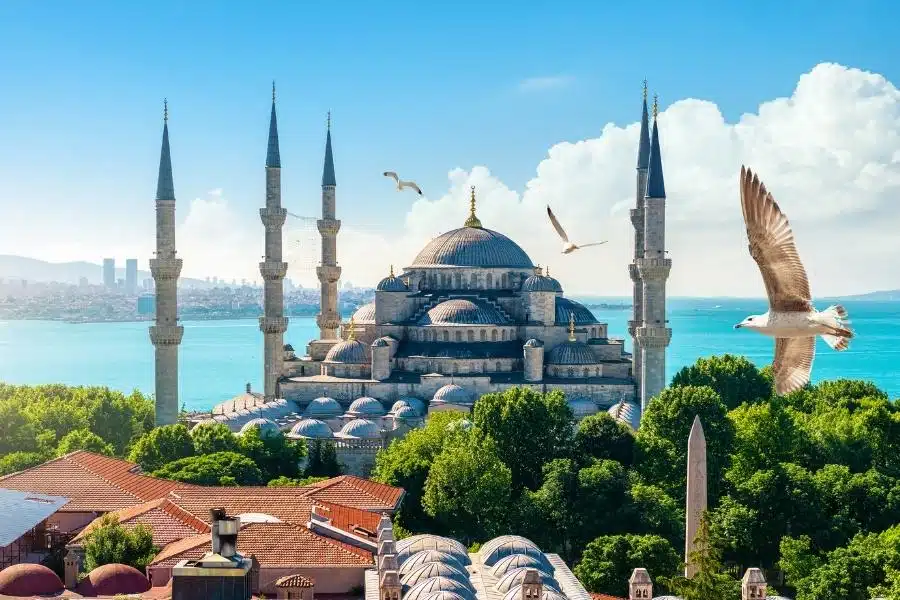Turkey, a nation bridging Europe and Asia, is an enchanting blend of ancient traditions, breathtaking landscapes, and vibrant city life. Known for its rich history and cultural heritage, Turkey’s fascinating past and timeless traditions make it an ideal travel destination for those looking to experience a unique mix of the East and West. This article will guide you through Turkey’s yenişaak from historical monuments to traditional experiences, inviting you to discover the hidden treasures of this mesmerizing country.
1. The Allure of Istanbul: Where East Meets West
The Historic Sites of Istanbul
Istanbul is Turkey’s most renowned city and a cultural epicenter with an array of historical sites. The Hagia Sophia, a masterpiece of Byzantine architecture, is now a mosque but began as a Christian basilica and later became a museum. Its magnificent dome and stunning mosaics embody Turkey’s cultural blend.
The Grand Bazaar and Spice Market
A trip to Istanbul wouldn’t be complete without exploring the Grand Bazaar and the Spice Market. With thousands of vendors offering everything from intricate carpets to exotic spices, these markets transport visitors into a world of colors, aromas, and sounds.
2. Ephesus: Walking Through Ancient Greek History
Ephesus, one of Turkey’s most iconic archeological sites, draws millions of tourists each year. Once a bustling city in the ancient Greek world, Ephesus boasts well-preserved ruins such as the Temple of Artemis and the Library of Celsus. Visitors can walk the same streets as ancient Greeks and marvel at architecture dating back to the Hellenistic period.
3. Cappadocia: Land of Fairy Chimneys and Hot Air Balloons
The Unique Landscape
Cappadocia’s otherworldly landscape, featuring surreal rock formations called fairy chimneys, is a natural wonder shaped by volcanic activity and erosion. The area’s ancient cave dwellings, some of which are now hotels, add an extra layer of fascination.
Hot Air Balloon Rides
Cappadocia’s hot air balloon rides are a dream experience for travelers, offering breathtaking views of the entire region at sunrise. This activity is often described as an unforgettable experience, providing a unique perspective on one of Turkey’s most enchanting regions.
4. Pamukkale: The Cotton Castle
Pamukkale, known as the “Cotton Castle,” is a stunning natural wonder with terraces of white calcium formations cascading down a hillside. This UNESCO World Heritage site is also home to the ancient city of Hierapolis. Visitors can walk through Pamukkale’s travertine pools and immerse themselves in thermal waters believed to have healing properties, blending relaxation with cultural discovery.
5. Antalya: Gateway to the Turquoise Coast
Exploring the Old Town
Antalya, a coastal city on the Mediterranean, is known for its beautiful beaches and ancient ruins. The Old Town (Kaleiçi) is lined with Ottoman-era houses, historic mosques, and Roman gates, offering a scenic and historical ambiance.
Underwater Archaeology and Ancient Ruins
Antalya is also an underwater archaeologist’s paradise. The sunken cities and shipwrecks of the Turquoise Coast make it a prime destination for divers. The remains of ancient settlements, like Phaselis, and sites such as Olympos National Park allow visitors to experience Turkey’s historical allure in unique ways.
6. Konya: A Spiritual Hub and Home of the Whirling Dervishes
Konya is the heart of Turkey’s spiritual culture, known primarily as the birthplace of the Sufi poet Rumi. The Mevlana Museum houses Rumi’s mausoleum and is one of the most visited sites in Turkey. Visitors can experience the Whirling Dervish ceremony here, an entrancing ritual that has become symbolic of Turkish culture and Sufism. For those interested in spiritual traditions, Konya offers a profound insight into Turkish mysticism.
7. Turkish Cuisine: A Culinary Journey Like No Other
Turkish cuisine is an integral part of the country’s cultural heritage. With influences from the Ottoman Empire, the food reflects a unique mix of Mediterranean, Middle Eastern, and Central Asian flavors.
Iconic Dishes to Try
From the savory delight of kebabs and mezes to the sweet indulgence of baklava and Turkish delight, each dish tells its own story. The traditional breakfast spread, known as kahvaltı, includes various cheeses, olives, and freshly baked bread, offering a feast for the senses.
The Ritual of Turkish Tea and Coffee
Turkish tea and coffee are more than just beverages—they are symbols of hospitality and tradition. Served in small tulip-shaped glasses, Turkish tea is a staple in every household, while Turkish coffee, with its strong flavor and ritualistic preparation, has earned a place on UNESCO’s Intangible Cultural Heritage list.
8. Turkey’s UNESCO World Heritage Sites
Turkey is home to 19 UNESCO World Heritage sites, each a testament to the country’s historical and cultural significance. These include historical sites like the ancient city of Troy, the archaeological site of Göbekli Tepe, and the Neolithic site of Çatalhöyük. These sites offer a window into the deep and diverse history of human civilization, showcasing Turkey’s cultural and historical legacy.
9. Turkish Arts and Handicrafts: A Tradition of Excellence
The Art of Turkish Carpets
Turkish carpets are a symbol of the country’s artisan heritage. Each carpet is intricately woven by hand and carries patterns and colors unique to the region. Visiting carpet workshops in cities like Istanbul and Cappadocia provides insight into this ancient craft, where artisans pass down their skills through generations.
Calligraphy and Miniature Art
Turkish calligraphy and miniature painting are also notable art forms. Ottoman-era calligraphy, often seen on mosques and manuscripts, represents the country’s Islamic artistic heritage. Miniature paintings, meanwhile, depict historical scenes and stories, reflecting the rich artistic culture of Turkey.
10. Experiencing Turkish Festivals and Celebrations
Turkey’s festivals and celebrations showcase the vibrant cultural heritage of the nation. Events like the International Istanbul Film Festival and the Antalya Golden Orange Film Festival reflect Turkey’s cinematic contributions, while traditional festivals like the Kirkpinar Oil Wrestling Festival in Edirne celebrate Turkish customs.
Religious and Cultural Festivals
Turkey’s most significant religious festivals, such as Eid al-Fitr and Eid al-Adha, are celebrated with grandeur. The Hıdırellez Spring Festival, held in early May, is also a popular event where people gather to celebrate the arrival of spring with music, dancing, and traditional foods.
Conclusion: Turkey Awaits the Curious Traveler
Turkey’s cultural gems offer travelers an unforgettable journey through history, tradition, and natural beauty. From the timeless streets of Istanbul to the mysticism of Konya, the country’s diverse heritage is woven into every corner. As a meeting point of continents and cultures, Turkey stands as a testament to the enduring spirit of civilization, welcoming visitors to explore its wonders and become part of its ongoing story.












